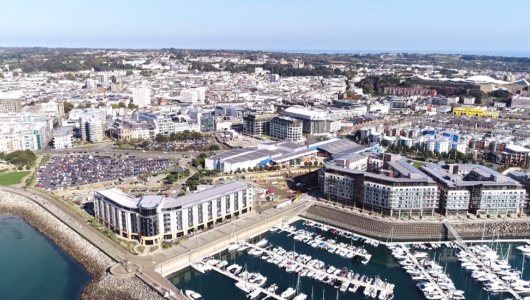That was the view of panellists at a recent virtual roundtable event for US private investors, hosted by Invest Africa and supported by Jersey Finance, which explored the South African private equity landscape, US capital flows into Africa, and the findings from a recent report, published by African Business magazine and supported by Jersey Finance, entitled ‘South African Fund Managers: Trends in Fund Domiciliation and Capital Raising’.
In terms of the overall private equity landscape in Africa, there is a clear upward trajectory. Speakers at the event highlighted that the African market has continued to see strong growth in overseas private equity investment in recent years, despite the challenges of the past year, with US private equity investment among the highest capital flows into South Africa.
In a keynote speech at the event, Tanya van Lill from the Southern African Venture Capital and Private Equity Association (SAVCA) discussed how, despite the disruption caused by COVID-19, the African market was still providing opportunities:
“65% of LPs in the AVCA 2021 Private Equity Industry Survey say they still found Africa an attractive investment route,” she said. “They also indicated they will increase their investment on the continent over the next three years.”
Acknowledging that there was an initial slowdown in activity at the beginning of last year, she explained that activity “picked up exponentially from Q2/Q3 last year.”
This confidence and optimism in the African market was echoed by Dr Desné Masie, Chief Strategist at IC Intelligence, author of the African Business report:
“The past two years have seen unprecedented capital commitments to Africa in foreign direct investment as the region becomes more economically and politically strategic. I think we can now expect to see increased flows from the USA, with the new Biden administration and its commitment to impact investing.
“The past two decades have seen South African private equity expertise facilitate investment into retail, consumer, real estate, and infrastructure investment in particular, across the wider African continent, typically partnering with development finance institutions (DFIs) from the UK and Northern Europe – but also with investors in South Africa, the US and Asia, to drive economic development.”
It is this focus on economic development, infrastructure and sustainability that increasingly looks set to frame private equity in Africa, with Tanya highlighting how investors are looking at opportunities in healthcare, life sciences, financial services, technology and agri business:
“We’re seeing a lot of technological solutions coming out of the continent, specifically in the agri space, which seemed to create a lot of excitement for potential investors. There is also a big focus on infrastructure investment, not only for South Africa but for a lot of the countries on the African continent, given the deficit in infrastructure investment.”
Meanwhile, referring to the findings of the recent fund domiciliation report, panellists pointed to how geopolitical shifts, such as the change in political landscape in the US and Brexit, as well as the longer-term impact of the pandemic, are offering up opportunities for private and institutional investors looking at Africa.
Sustainable finance in particular is a major emerging driver of capital flows, with IFCs like Jersey well placed to support investment aimed at delivering impact in Africa. Highlighting the impact that private equity and venture capital has on the continent, Tanya commented:
“DFIs have played a fundamental role in the growth of private equity on the continent. As a result of that, a lot of the fund managers that are investing on the continent are already mature and familiar with ESG and impact investing practices.”
This was a sentiment shared by speakers, with Desné adding that IFCs should have an important role in facilitating this investment:
“A lot of investment flows into Africa are facilitated by DFIs who are familiar with impact investing in the ESG space. There’s a big opportunity there, as we see capital shifting to a more sustainable basis. There’s a role for IFCs to play in extending their financial expertise into these investments of private and institutional investors, in a cost- and tax-efficient setting, with support from DFIs.”
With reference to a recent fund domiciliation study published by IFI Global, Jersey Finance’s Philip Pirecki, Business Development lead for the Americas, highlighted Jersey’s strong position in supporting this dynamic and the rising interest from US investors in particular:
“Since we opened our office in New York roughly 18 months ago and particularly since the middle of 2020, we have seen a steady increase in African initiatives with a nexus in Jersey. With respect to the US specifically, year-on-year we have seen a 40% increase in the number of Jersey vehicles established, and a 17% increase in US-based managers, using Jersey for structuring.”
Meanwhile, substance and good governance is also a rapidly rising issue for investors, with delegates commenting on the importance of bringing on local NEDs to support judicial and governance issues for international investors.
“The ultimate factors leading to the choice of jurisdiction are often LP led and this is determined by some key factors, including familiarity, cost, tax neutrality, regulation and governance and the quality of local service providers and non-executive fund directors,” said Desné.
This is a trend that resonates well with Jersey’s proposition, which, as Elliot Refson, Head of Funds at Jersey Finance explained, is founded on the basis of good governance and a presumption towards substance:
“From a NED perspective in Jersey, we have more than 13,500 people employed in the finance industry and we have a very asset class specific pool of NEDs, be that real estate, infrastructure, private equity or hedge. It’s one of our greatest strengths. We can provide true and proper substance at the NED level and at the governance level.”
Looking to the future, the speakers pointed to some key recommendations for US investors looking at Africa, with the clear message that, while there are significant opportunities for investors, careful consideration needs to be given around taxation, structuring, greater reporting around ESG and a demand for flexible and innovative structures for debt, equity and even mezzanine financing.
Highlighting the importance of a certain and robust treaty framework in directing investment into Africa, Tom Le Feuvre, Director – Global Markets & International Agreements for the Government of Jersey, concluded:
“Bilateral treaties providing tax certainty and investor protection are clearly important to global investors. Jersey is making exciting progress here, which will place the Island in a leading position. Modern Bilateral Investment Treaties (BITs) provide for investor state arbitration and can provide additional confidence for investors who are looking at committing long-term, patient capital into Africa. In addition, Jersey’s offering provides tax neutrality, and that’s a real advantage, particularly given some of the big changes around international taxation that are going to affect the way international treaties work.”
The indications are that, with its commitment to tax transparency, focus on substance and experience, and long-standing commercial and political ties spanning sub-Saharan Africa and the USA, Jersey is ideally placed to capture the upside as US investors look to target Africa and play a part in its economic growth story.

